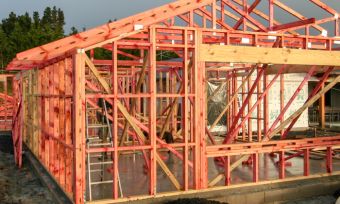Buying a new home is a significant milestone in anyone’s life. It’s an investment in a valuable asset that’s also a place to live and create cherished family memories. However, just because a home is new, doesn’t mean that it’s guaranteed to be problem free. Even with a brand new home, unforeseen repairs and maintenance issues can arise, potentially causing financial strain and stress. And that’s when home warranty insurance comes into its own.
As a safeguard against crippling remedial building work costs, home warranty insurance is an essential consideration for anybody buying a newly built home. This article delves into the concept of home warranty insurance in New Zealand, highlighting its purpose, coverage, and benefits.
What is home warranty insurance in NZ?
Home warranty insurance, also known as builder’s warranty or builder’s guarantee insurance, is a specialised form of insurance designed to protect homeowners purchasing a new build against defects or failures in the home.
When buying an existing home, it’s essential to do your due diligence: to get a building report and to check the home’s LIM report. However, if a home is yet to be built, while a LIM report might tell you if the land is prone to slips or flooding, you’re obviously not going to be able to get a report on the quality of the home.
In New Zealand, the Building Act states that any defects in a new home must be fixed within 10 years of its completion. However, if you’re the home owner, it can be hard, and very expensive, to achieve any positive outcome under the Act. Even if the building company that completed the property is still in business, it’s up to you to prove they are legally responsible for repairing the defect.
That’s why if you’re buying a newly built home, it’s a good idea to ensure you’ve home warranty insurance in place.
→ Related article: What Is a LIM report and Do I Need One?
How does home warranty insurance work?
Home warranty insurance works in the same way as general home insurance. Except, whereas general home insurance pays to rebuild your home in the event of an accident or disaster, home warranty insurance pays to remedy problems that may arise in your new home in the years after its completion due to substandard building work or materials.
And, because home warranty cover is bought from an insurance company, if a problem does arise, you simply make a claim through the insurer, rather than having to take a negligent builder to court, which can be a long, trying and expensive process.
Another invaluable benefit of home warranty insurance is that it protects the house for its entire cover period – usually 10 years – regardless of ownership. This means if you sell up and move, the new owners can enjoy the same peace of mind knowing that their home is covered for structural faults for the remainder of the warranty period.
Who offers home warranty insurance?
Some large building firms offer their own warranties on the new homes they build and sell, for example Signature Homes, and include the cost of the cover in the retail price of their homes. Other home builders offer their warranty cover through industry groups.
For example Fletcher Living and Generation Homes franchises offer their home warranties through the Master Builders Association. Whereas if you purchase a home from a builder that is a member of the New Zealand Certified Builders, you will qualify to apply for Halo, the association’s comprehensive 10-year residential guarantee.
If your builder isn’t a member of a trade association that offers its own home warranty insurance, or you just want to organise your own cover, insurance companies such as Stamford Insurance and Vero Liability offer building warranty insurance cover.
For further details of what home warranty insurance products are on offer in New Zealand, talk to an insurance broker or research providers online.
What does home warranty insurance cover?
Typically, home warranty insurance covers issues including:
- Building code compliance issues
- Poor workmanship and materials
- Structural defects
- Weather-tightness problems
However, it’s important to note differences in the levels of cover on offer. Each home warranty insurance policy is different, depending on your chosen level of cover and the provider. For example, a Master Build guarantee also covers the home owner for:
- Temporary accommodation while repairs are ongoing
- Non-completion of home, for example the builder goes bust
These two levels of cover could make all the difference if you’re left with a half-completed home and facing lengthy and costly delays to the completion of your new home.
Deposit insurance is also another area that requires careful consideration. If your policy only covers you for a 10% deposit, but you put down a 20% deposit, you could be left out of pocket.
As with all major financial transactions, it pays to consult experts, and to have your solicitor look over any contract before you sign on the dotted line.
What does home warranty insurance not cover?
Typically, home warranty insurance doesn’t cover issues including:
- Minor, non-structural defects
- Wear and tear caused by everyday use
- Damage caused by negligence
- Damage caused by accidents (home warranty insurance is not a replacement for home insurance)
- Issues arising from you voiding the conditions of the guarantee, for example, unauthorised home alterations
How much does home warranty insurance cost?
Typical home warranty insurance costs between 1% and 3% of the cost of the new build. However, prices depend on many factors, including the size and complexity of the build and the materials being used. And, as with other types of insurance, there are often extra cover options available.
To determine the exact cost, you will need to discuss the details of your preferred home warranty insurance cover with the provider.
What are the benefits of home warranty insurance?
While the majority of new home builds run smoothly, some do run into problems, leading to horror stories in the press. Home warranty insurance can prevent sleepless nights by offering:
Peace of Mind: Home warranty insurance offers homeowners peace of mind, knowing that they have financial protection in the event of unforeseen building defects. This assurance can help alleviate stress and anxiety associated with potential repair costs.
Cost Coverage: If covered defects occur within the warranty period, the insurance policy will typically cover the cost of repairs or replacement, reducing the financial burden on the homeowner. This can be especially valuable for major issues such as structural or weather-tightness problems.
Legal Protection: Home warranty insurance can serve as a safety net by providing legal protection for homeowners. In case of disputes or disagreements with builders or contractors, the insurance policy can help facilitate a resolution, potentially avoiding lengthy legal battles.
Property Value Preservation: Having a home warranty insurance policy in place can contribute to preserving the value of the property. Buyers often prioritise homes with warranties, as it provides reassurance that potential future issues will be covered.
How to choose a home warranty insurance policy?
When deciding on a home warranty insurance policy in New Zealand, it is essential to consider:
Policy Coverage: Review the specific coverage offered by different insurers, including the duration of the warranty period and the types of defects covered. Ensure that the policy aligns with your needs and the specific requirements of your residential project.
Insurer Reputation: Research the reputation and financial stability of the insurance company. Check customer reviews and ratings to gauge their reliability and promptness in handling claims.
Premiums and Excess: Compare levels of cover across different providers. It’s crucial to find a balance between affordable premiums and comprehensive coverage.
Policy Limitations: Understand any limitations or exclusions specified in the policy, such as cover for the non-completion of the home, provision of temporary accommodation, and the amount of cover for any lost deposit. Also be aware of any additional obligations or responsibilities on the homeowner’s part to maintain the warranty validity.
Home warranty insurance plays a vital role in protecting homeowners against potential building defects, unforeseen repairs and builder incompetency or insolvency. By providing financial cover and legal protection, it offers peace of mind and safeguards property values.
If you’re embarking a new-build journey, it’s a wise move to explore home warranty insurance options to ensure your new home helps build a secure financial future.
View Outstanding Value Home & Contents Insurance Awards
About the author of this page
This report was written by Canstar’s Editor, Bruce Pitchers. Bruce has three decades’ experience as a journalist and has worked for major media companies in the UK and Australasia, including ACP, Bauer Media Group, Fairfax, Pacific Magazines, News Corp and TVNZ. Prior to Canstar, he worked as a freelancer, including for The Australian Financial Review, the NZ Financial Markets Authority, and for real estate companies on both sides of the Tasman.
Enjoy reading this article?
You can like us on Facebook and get social, or sign up to receive more news like this straight to your inbox.
By subscribing you agree to the Canstar Privacy Policy








Share this article